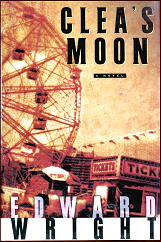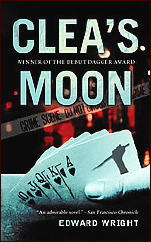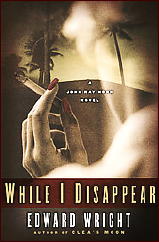Mon 28 Nov 2011
Archived Review: EDWARD WRIGHT – Clea’s Moon.
Posted by Steve under Bibliographies, Lists & Checklists , Characters , Reviews[2] Comments
EDWARD WRIGHT – Clea’s Moon. G. P. Putnam’s Sons; hardcover, April 2003. Berkley, paperback, 2004. Orion, UK, hardcover, 2003.

This retro-mystery set in late-1940s Los Angeles, a first novel by California-based writer, seems to have been published first in Great Britain, since it’s already won a Silver Dagger award given by that country’s Crime Writers’ Association.
It has a lot of the right ingredients going for it — starting with its former B-western movie star leading character, John Ray Horn — but as I’m sure I needn’t remind you, sometimes the whole is less than the sum of its parts.
The beginning is solid enough. Recently released from prison for a crime he did commit, no matter how justified, John Ray has been banned from the studios and has been forced to go to work as an enforcer for his former co-star, Joseph Mad Crow, an Indian who’s now the owner of a thriving casino.
The roles have been switched — a nice touch. John Ray is no longer the hero he once was, either on the screen as “Sierra Lane,” or in real life.
In fact, until he learns that his former stepdaughter has run away and disappeared, and he’s the one person who has the best chance of finding her, his life, in all likelihood, would have continued to slip away. Clea and her best friend Addie are girls on the verge of becoming women, and here lies a principal part of the puzzle that John Ray finds himself putting back together.

There is an analogy to be found here. The general Los Angeles area is a city on the verge of becoming a metropolis, a change that John Ray sees coming and finds lacking. Open space is disappearing, and housing projects are moving in.
All well and good. What’s more, some of the dialogue is reminiscent of Raymond Chandler, whose name you might be thinking right about now, a comparison not to be made lightly, and on occasion the resemblance is remarkable. The nightclub scenes are excellent, bringing pictures to mind some of the best of the film fare of the forties.
So what’s the problem? This is indeed Chandler country, strongly revisited, or at least it’s tiptoeing around it. But while John Ray is stalwart and strong, hard-boiled he’s not, and some of the decisions he makes are — well, let’s say they’re his own.
I also found the underlying theme of child pornography something less than savory. That’s primarily a personal reaction, I should add, but in terms of entertainment value, as far as I’m concerned, it’s a large empty hole I found hard to overcome.
The biggest disappointment, though, was, overall, the story’s amiable but eventual predictability, a trait in which Mr. Chandler, even without having the advantage of going first, never indulged. It’s a workmanlike effort, but when you read it — and if you’ve read this far, you definitely should — you’ll see what I mean.
PostScript: And in closing, let me ask you this. In almost every novel like this, why is it that everyone who smokes, lights up a Lucky?
The John Ray Horn series —
1. Clea’s Moon (2003)
2. While I Disappear (2004) [Shamus Award, Best Novel winner, 2005]

3. Red Sky Lament (2006) [Ellis Peters Historical Crime Award, UK, 2006]
[UPDATE] 11-28-11. A number of people I know, including Jeff Meyerson, who stops by here every so often, liked this book a lot more than I did. Even more telling, perhaps, Wright has won several awards for this series. Maybe I’m wrong — or I was, eight years ago. I dunno. Maybe I should put this at the top of my To Be Read Again list.
November 29th, 2011 at 12:37 pm
I had a similar reaction to this: loved it at first but it slowly lost my interest. Great set up with the former sideback now the boss; lackluster execution. I tried twice to get into the sequel with the disguised–sort of–Howard Hughes plot. Disappointing.
November 29th, 2011 at 1:04 pm
The second one is the one that won the PWA Shamus Award. I have it but haven’t read it, but what surprises me is that as far as I’ve been able to tell, the third book was never published in the US, only in England (by Orion).
It was distributed and sold here, but I never saw a copy.